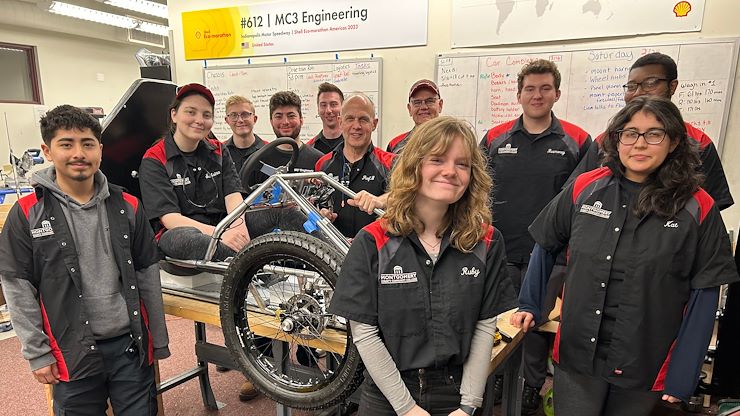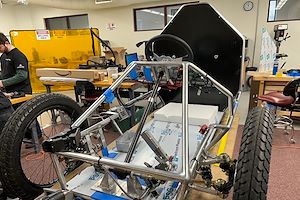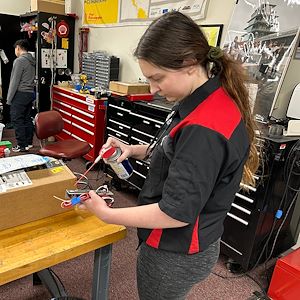
Project INNOVA team members at Montgomery County Community College have worked all year long on building a hydrogen fuel cell-powered urban concept vehicle from scratch to compete in the 2024 Shell Eco-marathon Americas regional competition in Indianapolis April 3-7. Photos by Eric Devlin
The project INNOVA team is ready to push the pedal for the medal.
 Nearly a year after its hydrogen fuel cell-powered urban concept vehicle placed second in its category during the Shell Eco-marathon Americas 2023 regional competition
at the Indianapolis Motor Speedway, the Montgomery County Community College team is
gearing up for another shot at the title. This year, Engineering Science students and advisors are confident their trip back to the Brickyard will yield even
greater success and they’ll punch themselves a ticket to the world driving championship
in Britain.
Nearly a year after its hydrogen fuel cell-powered urban concept vehicle placed second in its category during the Shell Eco-marathon Americas 2023 regional competition
at the Indianapolis Motor Speedway, the Montgomery County Community College team is
gearing up for another shot at the title. This year, Engineering Science students and advisors are confident their trip back to the Brickyard will yield even
greater success and they’ll punch themselves a ticket to the world driving championship
in Britain.
The Shell Eco-marathon Americas 2024 regional competition will be held April 3-7 again in Indianapolis. The annual academic program “challenges talented students to design and build cars, considering technical and behavioral factors to achieve game-changing energy efficiency results,” according to its website.
The project INNOVA team includes MCCC students Ruby Armor, Franzine Bagalawis, Evan Baltz, Alivia Case, Alvin Munoz Cervantes, Katherine Cocar, Russell Cole, Joseph DeFazio, Odain Forrester, Liam Gundersen, Quentin Haines, Jake Hamburg, Paul Jacobs, Gabrielle Joella, Rob Kay, Nate Mayer, Joseph Morris, Val Pero, Evan Pickel, Thomas Quinn, Sabrina Turner, Josue-Guinto Veronica and Ian White.
High Hopes
Engineering Science Professor and project INNOVA faculty advisor William Brownlowe believes the design of this year’s vehicle is built to win.
“This is by far our lightest chassis. Our power train is more efficient. We’re also going to use a streamlined body made of carbon fiber,” he said. “We’ve never attempted something like this before, but we have a good, talented team with skilled members this year with automotive experience.”
The project INNOVA team has sought to participate in the Shell competition since building a first-generation vehicle design in 2015. It actually qualified for the competition in 2017 in Detroit with a vehicle that weighed 320 pounds but didn’t make it past the vehicle inspection. Then again last year the team made it to the race with a slimmed down vehicle weighing 280 pounds.
The goal of last year’s team was to get through the rigorous inspections required he said, in order to race the car on the inside track of the famous racecourse.
“This year the goal is to win one of top slots to go to world driving championship in Britain,” said Brownlowe. “We think this vehicle will do that.”
The team spent the summer and fall completely redesigning the vehicle from scratch to make it lighter and more aerodynamic. Part of the funding for the team to purchase a new hydrogen fuel cell to power the car came from a grant from Lockheed Martin to the STEM Division to support student engagement and retention in STEM programs.
Entering the competition at a sleek 200 pounds, students are ready to compete against four-year institutions and high school academies from across North and South America. Twenty-three students have played a hand in building the fourth generation of the vehicle from scratch. About 12 will make the roughly eight-hour trek to Indiana to compete.
First-year Mechanical Engineering Science major Ruby Armor is this year’s project INNOVA team manager. The 19-year-old from Ambler said this year’s team is in a much better position to achieve success from where it was last year at this time.
“We started building from complete scratch and we’ve gone way farther,” she said. “Last year we tested the car for the first time right before we left. This year we tested it before winter break. I expect good things out of this car.”
Mechanical Engineering Science major Tom Quinn, 24, of Royersford, said he’s optimistic given how well the test drives have gone so far.
“We just have to play our cards right,” he said.
 Mechanical Engineering Science major Sabrina Turner, 20, from Colmar, drove the vehicle
last year and will drive again this year. She thinks the team has learned from last
year’s competition and made the necessary adjustments.
Mechanical Engineering Science major Sabrina Turner, 20, from Colmar, drove the vehicle
last year and will drive again this year. She thinks the team has learned from last
year’s competition and made the necessary adjustments.
“We know what we’re doing this year,” she said. “We did really well last year for not quite knowing what we were getting ourselves into last year.”
“As far as I can tell, yes, we do have big shoes to fill,” said Russell Cole, 19, a Mechanical Engineering major, from Colmar, who is in charge of 3D printing many of the parts that will go on the vehicle, “but we’ve come a long way from last year. Last year, just the frame alone was 60 pounds. This year I believe it’s about 20 pounds. So, we’ve come a long way and I’m confident in the stuff I’ve made.”
Real world experience
The project INNOVA team gives students real-world experience collaborating with individuals from diverse backgrounds and with different skillsets.
Team Technical Advisor Griff Francis said it mirrors what they’ll experience in the working world very soon.
“As a career engineer, I think this duplicates what they’ll see in many jobs,” he said. “Nobody’s working on their own. They’re working as a team. They’re working with a multidisciplined team, where you have mechanical engineers, electrical engineers, computer programmers. So, you’re working with people with different skills, and it always helps to know a little about what their skills are and not just in isolation. I think this duplicates real world environment.”
Katherine Cocar, a 20-year-old Mechanical Engineering Science major, who lives in Pottstown, is the logistics officer for the team. She’s been working to establish connections with area businesses and has handled the registration paperwork, so when the team arrives at the competition everything goes smoothly.
“Our team can accomplish so many things but if it doesn’t have the right resources or connections, it won’t go anywhere,” she said. “It can’t go anywhere without the fuel. So, I wanted to help and take that role.”
Electrical Engineering Science major Liam Gundersen, 20, of Gilbertsville, said he’s enjoying his first year on the team. He’s been working to install GPS into the vehicle that displays the speed of the car for the driver and a flow meter that communicates to the team how much hydrogen has been used.
Gundersen said he’s enjoying how he’s applying what he’s learning in the classroom to a real-world scenario.
“It gives me actual experience than just sitting in the classroom,” he said. “It’s seeing what you’ve learned actually apply. It’s a lot different from seeing it in the classroom.”
Quentin Haines, 22, from Abington, a first-year Mechanical Engineering Science major, said he’s enjoyed the experience on the team because it’s allowed him to learn new skills from others. Tom Quinn, he said, has taught him to use the Computer Numerical Control machine.
“I love to see that,” he said. “I like to learn more about that. Meeting people and learning what they know. I love learning.”
Eighteen-year-old Jake Hamburg, of Eagleville, a first-year Electrical Engineering Science major, said he’s hoping to use what he’s learned at MCCC to transfer to Drexel University and earn a degree in Computer Engineering. He said he’s really enjoying his time on the INNOVA team because it’s unlike anything he’s done before as a student.
“In high school, in the electric car club, we took a 1969 Triumph Spitfire and converted it to electric,” he said. “But it was kind of like reverse engineering. We were taking stuff that was already there and adapting it to what we needed. What we’re doing here is just creating something from scratch, which I think is really cool.”
Opportunities to help the team extend beyond the STEM fields too. Francis said students from all educational backgrounds can contribute. From project management opportunities for Business Administration majors, to social media, logo design or simply taking notes during test drives, there’s a way for everyone to contribute.
“This type of project gives students the opportunity to go a little bit out of their comfort zone and do something they normally wouldn’t do,” said Francis. “If they’re up for it, here’s the opportunity to do it.”
Brownlowe said past students who’ve worked on the INNOVA project have leveraged the experience to transfer to four-year institutions and later to find high paying jobs in their field.
“If I look at the team that went to Detroit,” he said, “out of seven students, five used the experience to get their jobs. They used it to transfer to a four-year institution and to get their current job. Three work at Lockheed.”
Brownlowe appreciated the continued support the College has given the team each year.
“We have a great appreciation for mccc support of this project. We’re not a club. We’re not really a sports team. We’re a project. It’s an ongoing project with collaboration of industry support, college support, grant support from different organizations. We’re appreciative of all that.
“As long as we’re doing this, it serves the students and the institution and the community at large well.”
This year the project INNOVA team is determined to raise $25,000 for the vehicle. To support this effort, make a donation to the team’s fundraising page or contact the Montgomery County Community College Foundation at 215-641-6324 or by email.
